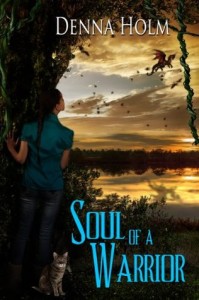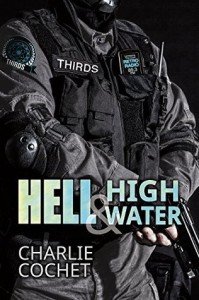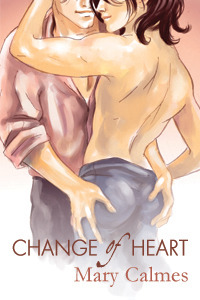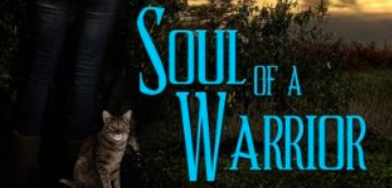 Author, Denna Holm sent me an ecopy of what she called a sci-fi romance, titled Soul of a Warrior.
Author, Denna Holm sent me an ecopy of what she called a sci-fi romance, titled Soul of a Warrior.
Description from Goodreads:
Hours before she is torn away from everything she knows, Kimi Wicker comes face to face with a tall blond-haired stranger who claims to be her mate. But he also claims to come from another world. Thinking the guy a crazy psychopath, Kimi tries to run with her two best friends and a feisty tabby-cat in tow. No one anticipates a second stranger showing up, one with a completely different agenda.
Kimi and her friends don’t know who to trust when they find themselves abandoned on the hostile alien world. They are given no reason for why they are being left behind and no weapons to defend themselves against the predators of this strange new world.
One man will do anything to see Kimi brought back safely, even sacrifice his own life. The second wants them both to suffer, alive, but forever out of reach of each other
Review:
I read a lot. It’s my primary hobby. As a result, I write a lot of reviews. As anyone who’s read them regularly knows, it’s almost never a good sign when I start taking notes on a book. Occasionally I’ll jot down something I loved enough to want to ensure I remember to mention it. But more often than not, I start a notes page when the irritants start to pile up. I’m afraid Soul of a Warrior had a fairly long list of notes by the time I finished. This is generally not a good sign.
Now, I want to say, before I get into what will likely be an extensive list of reasons I didn’t like the book, that the writing and copy editing was pretty good. The idea for the book also seems to be an interesting one. Prior to sitting down to write this review I checked other readers’ reviews on both Goodreads and Amazon and the book seems to have only 4 & 5 star reviews with a few lower ratings thrown in without explanation. So, maybe it’s just me. I’d encourage people to pick it up and decide for themselves.
So, to start with my biggest issue, this isn’t one book, it’s two. And I don’t mean one book that should have been broken into a first and second in a series. I mean two separate books, one sci-fi/action adventure and one Urban fantasy/Paranormal romance. If you combined the first 15% with the last 25 % of this book into one story and then renamed the characters of the remains of this book you would have two complete, better stories as a result.
The plot of Soul of a Warrior, as it stands, simply wanders all over the place, with very little to hold it into a nice tight story…ok, nothing to hold it together. It’s just plain not a nice tight story at all. It starts out as urban fantasy/PNR (with cowboys, oddly enough), then drops the PNR completely for a while and falls into sci-fi/fantasy for the vast majority of the book, before throwing the paranormal and romantic elements back in at the end. (Additionally, I also felt it didn’t know if those sci-fi/fantasy parts wanted to primarily sci-fi or fantasy. There were a lot of elements of both. The genre title makes this easy to combine and disguise the disquieting effect of a book that combines too many dragons and mystical creatures with stun guns and transporter beams.) It’s jarring and very obviously different in tone and subject matter.
Further, the H/h (both sets, and there shouldn’t be two sets because one gets very little attention and it’s just a distraction from the already barely linked together plotline) are rarely in the story together. This means it doesn’t feel like their story. It feels like Kimi, Amanda & Keith’s Lost In Space (or on an alien world) adventure with the occasional discordant chapters dedicated to the strange guy Neyvarre thrown in on occasion.
Honestly, the sci-fi adventure would have been enough of a story without the PNR that’s tacked onto the beginning and end of this book, especially since I felt it was given a lot more attention than the PNR element. The PNR bits felt like a whole string of vampire/werewolf tropes strung together, instead of an original story. I know it’s hard to write anything new these days, but just about every aspect of that part of the book I’ve seen somewhere else (even the vampires from space). Again, as written this is essentially two stories. Trying to merge the two, as Holm has, only weakened both.
I very rarely say a book needs further editing. I think it’s arrogant. Who am I to make such a declaration? And when I do, it’s usually in reference to copy edits, which to be fair I found very few of. But here I’m going out on the limb. This book needs further content editing. It needs someone impartial to pull all the disparate parts into two readable books. If done well, Holm could have two eminently exciting stories on her hands.
Ok, that took a long time to explain and is the main issue I had with reading it. But it’s not the only thing that bothered me. There were also some pet peeves that I alternatively rolled my eyes or ground my teeth at.
Here is one: In PNR, having women letting their sexual inhibitions go by virtue of being half asleep is a fairly common (and for my part, HATED) trope. Here it was used to neatly sidestep any sort of getting to know each-other between the main H & h (the secondary ones didn’t even get this small courtesy). It was also used to allow Kimi to beg for ‘it’ without compromising her apparently all-important innocent virgin status. Because, of course, a ‘good girl’ wouldn’t beg…or even accept ‘it’ and our H only deserves the best, i.e. a virgin, who isn’t supposed to have any sexual desire of her own. And unless she’s begging for ‘it’ our ‘honorable’ H would never give ‘it’ to her. So obviously, the only way for Kimi to be allowed sexual expression and for Neyvarre to take her is to completely remove her own volition from the equation. grrr Why? Why can’t she be adult enough to have and express desires, both for Neyvarre and/or at any point in her twenty-something years on Earth?
Another is the way women/mates are handled in the text in general. Again, this isn’t uncommon in PNR, but it still annoys me to encounter it (and, as I said, string of tropes). Mates, i.e. women, really seem like possessions. Men are driven to crazy revenge plots by loosing them or driven to crazy rescue attempts to save them or to crazy protective actions to, well, protect them. They are elements that drive men to action, but there doesn’t seem to be much need to engage with them…or, you know, seek their consent for anything, not even moving across the galaxy to their ‘new home.’
This idea is reinforced by their repeatedly being referred to as “the females”— impersonal almost inanimate individuals, instead of as Kimi and Amanda…you know, people. They’d been claimed as surely as if a caveman whacked them over the head with a club and dragged them back to the cave or a clan raiding party stole them away in the night. Their feelings on the matter were just expected to fall in line eventually. And they did.
Similarly, I was annoyed to discover that men finding their mates seemed to be the only dynamic that mattered, even though there are obviously female vampires. Again, this isn’t a first. It’s always been an irritant of mine that in PNRs in which supernatural beings search out their mates, it’s almost always just the men. The whole mating process often doesn’t even have a female equivalent. It’s so common it’s hardly worth commenting on. But here I got excited when I was momentarily thrilled to find that this book allowed a female to speak about the possibility of finding her mate. Then, two or so pages later this was said, “Slight though the odds may be, other of our males might have a chance to find unclaimed mates on Earth.” Really? The female population was completely left out again, then?
Characters also display knowledge or assumptions they shouldn’t be able to. Maybe the reader could, but the reader has access to information the characters don’t. For example, at 94% Amanda says, “I know you think you love Neyvarre, and I’m happy for you, really I am.” The problem is that there had been no discussion about Neyvarre between Amanda and Kimi and, had there been, Kimi would not have spoken of love, as she hadn’t seen him in weeks and distrusted him at that time. So, what does Amanda base this sudden proclamation on?
Even worse, Amanda expresses hesitancy at being a werewolf’s mate and possibly a werewolf herself, when as far as I can see she was never even told she was Tallyn’s mate. (This is also an example of what I meant when I said having a second romantic pair cheated that second couple of needed or deserved screentime.)
Not only do the characters, as a group, come to decisions only a single one (or even just the reader) should be privy to, they also have mysterious changes in disposition. The characters meet BRIEFLY about 15% into the book, at which point Kimi doesn’t trust Neyvarre at all, and then they are separated until about 90%. At which point they meet again and are instantly all lovey-dovey and trusting of one another.
Now, this holds a certain emotional resonance for the reader, as he/she has seen both parties’ struggles (though mostly Kimi’s), but if you think about it, the characters haven’t seen or really communicated in that time, so there is no reason for there to have been such a drastic shift in attitude.
There were also a number of subtle ways Kimi was disempowered, even while doing things that should have made her a strong female lead. For example, allowing a man to take over her body in order to accomplish a task and thereby denying her, not only her own victory, but responsibility for it as well, as she was, “relieved not to be in control”. This is a theme that was echoed two or pages later: “In fact, she rather liked being able to press up against his strong body, lean on him and let someone else control the reins for a while.” ‘Cause, of course, no woman would ever really want to be in real control.
Last of the fairly major irritants were the long rambling passages that broke up any action at inopportune times. For example: Kimi being talked through the mechanics of riding a dragon (very much like a horse apparently), which killed any anticipation of the actual dragon race. Or long descriptions of the Hunter’s clothing, including the animal it comes from (even though this is a spacefaring/ transporter using species they still wear basic leathers), it’s uses, protections, etc at 84% through the book. This despite the fact that they’ve been wearing the same clothes since the beginning. 84% through seems an odd time to decide to describe them.
Ok, so those are my biggies. Here are my minor ones (in no particular order), many of them are just basic ‘but, huh?’ type issues.
- How come, if no one would believe Elias when he claimed to have found his mate in a human, does everyone unquestioningly believe Neyvarre? Without him ever saying so even?
- The classic, “Hi, I’m the villain. Let me introduce myself and my evil plans to you.”
- Unknown side characters that are introduced, only to die. It clutters the narrative.
- Endearments: the Hs that always call their mates ‘Little One,’ ‘Princess,’ or worst of all ‘Child.’ (I don’t care how much longer the vampire or werewolf has been alive than the human, if they’re gonna have sex, ‘Child’ is not an appropriate pet name.) Plus, Amanda, Kimi and Keith are always calling each-other ‘babe,’ ‘Sweety,’ ‘Baby.’ I’m from The South and this still annoys me.
- Huge infodumps
- occasionally stiff dialogue, especially from the vampires and werewolves
- flat, underdeveloped characters & little world-building outside of the dangers of Lavina.
- an unexplained religious undercurrent
- Kimi was once able to telepathically contact Neyvarre. He tries to help her. So, why does she never try it again? Conversely, why can’t he contact her?
- The odd language disparities, like riding a dragon and talking about ‘powering up’ one’s ability. Again, is it sci-fi or fantasy?
- Decisions that make no sense at all, beyond convenience to the plot progression. Example: after fighting to survive for weeks on a hostile world Kimi follows a werewolf she just met and within minutes agrees to gamble his, her, Amanda and Keith’s lives in a race she has no reasonable expectation to win for a man she hasn’t yet met. And everyone just goes along with it.
- All the hugging at the end. I’ve come to the conclusion over the years that anytime a book and it’s character degenerates into copious amounts of hugging then it’s lost it’s way somehow. I’m not just being snarky. I find it often accompanies a failed attempt to symbolise everyone’s happy ending and just comes across as sappy and overused instead.
- Passages like this: “It shocked her to see teaSoul of a Warriorrs shining in her friend’s eyes.” (That’s how it’s written too, just like that, with the missing space and extra Rs. I left it that way because I don’t know if it’s supposed to be that way or if it was an editorial error). But as this is, what I assume to be, the title passage it’s obviously important. But it shows up at 98% with no explanation. What the hell does it mean?
So, to wrap up, this book has great reviews. I remind potential readers of that. But I, personally, couldn’t find that shining example of literary genius others did. It’s mechanically fine, but basically just annoyed the hell out of me repeatedly for 200+ pages.
 I bought a copy of Charlie Cochet‘s Hell & High Water.
I bought a copy of Charlie Cochet‘s Hell & High Water.



